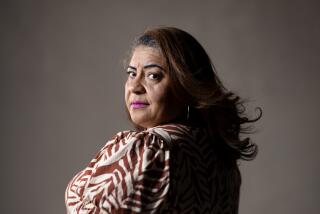L.A. Woman Heads AAUW
- Share via
One way to describe Sharon Schuster is to call her a Valley housewife with two grown children who has always been active in community affairs. Another is to note that Schuster for 12 years has been chief deputy for Los Angeles Councilwoman Joy Picus, a post that she will officially leave June 30 to assume leadership of the American Assn. of University Women.
Both descriptions would be accurate and, in Schuster, the two seem completely compatible. Her brand of activism has been that of a mainstream individual--starting with an education degree from San Jose State; years of teaching both mentally retarded and mentally gifted children; time for the PTA, the League of Women Voters, school advisory councils, boards of community agencies and services. And this weekend Schuster, who turns 50 on Aug. 26--Women’s Equality Day, she is proud to note--will take the reins of the 140,000-member AAUW, replacing outgoing president Sarah Harder of Wisconsin at the biennial convention in Washington.
Again, mainstream. But one of the most significant things about AAUW, which was founded in 1881 and now has 1,800 branches, is that in recent years it has sent out the message loud and clear that having a distinctly feminist agenda is now mainstream.
“I really see AAUW at the forefront of the women’s movement,” Schuster said recently. “We’re in a good place. Our members are used to leadership positions and ready to move forward.”
Calling itself the country’s “largest and oldest national organization working to promote equity for women and girls in education, the family and the work place,” AAUW has supported, campaigned and lobbied for feminist issues such as the Equal Rights Amendment, choice regarding abortion and reproductive rights, pay equity, comparable worth, child-care and health-care legislation, women in politics.
Not all of those issues have President George Bush’s support, but AAUW’s clout is such that Bush has accepted an invitation to address the convention Monday and is expected to focus on the changing work force.
Right for the Job
Maintaining such national prominence while changing from what some have regarded as a ladies’ club to a women’s organization with a feminist agenda is not done quickly or easily. And one AAUW member, Joy Picus, sees Schuster as just the right person to continue the job.
Next Friday, Picus will host a farewell at her City Hall office for the quiet-spoken woman whose gracious manner has often seemed that of someone who got things done--but in the background.
The two have been neighbors in Woodland Hills for 25 years, Picus said, raised their children and been active in AAUW and the League for just as long.
Schuster’s leadership style is not “flashy,” Picus said. Her specialty has always been legislative, and her method heavy on detail, strategy and process.
“Her style of leadership is to understand the issues, bring other people along with her and build a team,” Picus said.
Not an overnight success story, Schuster has been coming up through the ranks of AAUW since 1959: board and committee member; two terms as executive vice president; president, until now, of its Legal Advocacy Fund.
She says of herself, “I’m very action-oriented person. My strong background is in issues.”
Starts July 1
Schuster begins her new job on July 1, and said she will probably be on the road from one-third to half the time, back and forth between her home in Woodland Hills--where she lives with her husband Shel, a physicist--and AAUW’s Washington headquarters, and on to local branch groups around the country.
She is ready for more issues, and in an organization with a majority white membership, average age 55, she wants to see it do a more effective job of recruiting--on campus and elsewhere--younger and minority women.
Ironically, she believes that AAUW’s “biggest problem, organizationally speaking, is that the eventual success of the women’s movement has broadened out the choices for women. . . . They don’t need an organization to find their recognition and value, as was true in the ‘60s. Therefore the organization has to adapt to this reality. I call it success.”
More to Read
Sign up for Essential California
The most important California stories and recommendations in your inbox every morning.
You may occasionally receive promotional content from the Los Angeles Times.













